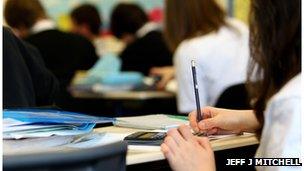Poor children need help with school entrance exams, says study
- Published

Some entrance tests are so tough that only pupils who have been coached can pass, argues a report
Some highly selective state schools should do more to help poorer children pass their entrance exams, suggests a government-funded study.
Only children whose parents can afford coaching can pass the toughest exams, says the report for the Cabinet Office.
Such schools "may owe their neighbourhood" more help for poorer children, suggests author David Boyle.
Grammar school heads said their schools were less socially selective than leading comprehensives.
The report, The Barriers to Choice in Public Services, looked at "whether inward-looking admissions criteria, for example by faith and super-selective schools, ought to be balanced by a broad duty to promote a social balance inside the school".
'A clear barrier'
It suggests that "state-funded schools which do not adopt some responsibility for the wider well-being of their neighbourhood may not be fulfilling the social contract that people might reasonably expect of them".
"If schools narrow their intake to those who can afford the coaching to pass entrance exams, then they may owe their neighbourhood some route whereby less advantaged local people can aspire to get their children up to that standard."
Author David Boyle, of the New Economics Foundation, told BBC News that he was not suggesting that all children should be coached to pass entrance exams into "super-selective" schools, but that the need for coaching to pass some of the tests was "a clear barrier" to some families.
A duty along these lines would not undermine the academic focus of super-selective schools, argues the study.
Barry Sindall, chief executive of the Grammar School Heads Association, quoted from a 2008 Sutton Trust study which suggested that the social make-up of grammar schools was often more diverse than that of the top 100 comprehensives where entrance is decided on proximity to the school, pushing up house prices and excluding poorer families.
Mr Sindall said that many grammar schools already offered "test familiarisation" sessions so that children from poorer families did not turn up at the entrance exam never having encountered those type of questions before.
"We want to make sure they are entering for the tests on a level playing field," said Mr Sindall.
He said that selective schools were working with academics to develop and adopt entrance tests that were resistant to coaching.
"All grammar schools want tests that are reliable and valid. We know we can't stamp out coaching but we can stamp out any gain from coaching."
Faith schools
The report says that the same argument about social selectivity could apply to the entrance requirements of some faith schools which require pupils and their families to belong to particular religions.
"The original purpose of faith schools was also to fulfil the demands of their faith by providing for the local neighbourhood and this objective may have become too secondary."
The Catholic Education Service rejected the suggestion that their schools were socially exclusive: "Catholic schools in England have higher proportions of pupils from ethnic minority backgrounds with 33.5% of pupils in Catholic primary schools from ethnic minority backgrounds compared with 27.6% nationally."
The statement also said that Catholic schools educate more children from the most deprived areas with 20% of pupils at Catholic secondary schools living in the most deprived areas compared with 17% nationally.
The Rev Nigel Genders, head of school policy for the Church of England's education division said: "Church schools, as opposed to faith schools, were set up 200 years ago to provide education for all.
"Church schools are hugely popular with parents, both the education secretary and prime minister send their children to one, and can become oversubscribed.
"In this case Church-related criteria for admissions may come into play.
"This would not detract at all from the school's commitment to the local community and certainly would not make it 'super-selective'."
- Published24 January 2013
- Published15 November 2012
- Published30 July 2012
- Published28 June 2012